|
|
|
Sort Order |
|
|
|
Items / Page
|
|
|
|
|
|
|
| Srl | Item |
| 1 |
ID:
117186
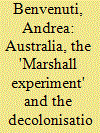

|
|
|
|
|
| Publication |
2012.
|
| Summary/Abstract |
As decolonisation gathered pace in Southeast Asia, Singapore became a source of considerable concern to the Robert Menzies government. Britain's hold on its colony appeared increasingly precarious as political turbulence gripped the island. With a predominantly Chinese population, Singapore was considered susceptible to communist China's propaganda and subversion. By relying on previously classified Australian and British diplomatic documents, this article sheds light on the Australian approach to Singapore's political and constitutional development between 1955 and 1956 and, in so doing, it hopes to make a contribution to a better understanding of Australia's policies in a rapidly decolonising Southeast Asia.
|
|
|
|
|
|
|
|
|
|
|
|
|
|
|
|
| 2 |
ID:
159682
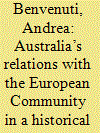

|
|
|
|
|
| Summary/Abstract |
In 2015, Australia and the European Union successfully negotiated a Framework Agreement. This agreement is an essential step in establishing a stronger Australia–European Union partnership and achieving closer bilateral cooperation. For years, negotiating such an agreement had proved impossible. In the 1970s, successive Australian governments showed interest in enhanced collaboration with the European Community, but the political climate for closer relations was far from encouraging. This article explains why this was the case. In doing so, it also explores how the Whitlam and Fraser governments envisaged, framed and developed Australia’s ties with the European Community in the 1970s, and asks whether a more positive approach on their part could have led to a stronger relationship. Based on recently declassified government files, this article shows that although both Whitlam and Fraser fully grasped the importance of the European Community as an emerging international actor and were willing to deepen Australia’s ties with it, significant constraints existed against enhanced bilateral cooperation. With the Common Agricultural Policy still a considerable challenge to Australian economic interests and with the European Community focused mainly on the management of its internal market, broader political considerations were inevitably relegated to the margins of Australia–European Community consultations.
|
|
|
|
|
|
|
|
|
|
|
|
|
|
|
|
| 3 |
ID:
170990
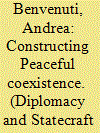

|
|
|
|
|
| Summary/Abstract |
ABSTRACT
In the mid-1950s, Jawaharlal Nehru advanced an alternative approach to regional security, pursuing it enthusiastically. He held that employing diplomacy in accord with the ‘Five Principles’ of peaceful coexistence, regional governments could establish ‘areas of peace’ and achieve ‘collective peace’. China played an essential role in this process, becoming the lynchpin of Nehru’s regional strategy. Although mindful of China’s potentially subversive role in Asia, Nehru downplayed such misgivings, urging Beijing’s commitment to the Principles. By doing so, he endeavoured to ‘create an environment’ where China would find it increasingly difficult ‘to break away from the pledges given’. Furthermore, by supporting China’s participation to the 1955 Bandung Conference, he wished to end Beijing’s isolation and transform India’s giant neighbour into a stabilising regional force. This analysis revisits Nehru’s policy of peaceful coexistence, making a fresh contribution to the study of Cold War India’s external relations. In addition, it explains how such a policy, crucially centred on Sino-Indian rapprochement, took shape and appeared, at least briefly, to make progress and deliver on Nehru’s expectations
|
|
|
|
|
|
|
|
|
|
|
|
|
|
|
|
| 4 |
ID:
111160
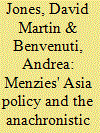

|
|
|
|
|
| Publication |
2012.
|
| Summary/Abstract |
A powerful orthodoxy exists in the academic literature devoted to the history of Australia's post-1945 international relations. It maintains that suspicion and condescension permeated the attitude of the Menzies government (1949-66) towards Asia. Accordingly, Menzies' regional policies not only prevented Australia from engaging meaningfully with its Asian neighbours, but they also ended up antagonising them. This article critiques this view and instead contends that the assumptions that inform the contemporary construction of Menzies' regional policy are overdetermined by an anachronistic disregard for the diplomatic dynamics, political challenges and economic realities of cold war Asia.
|
|
|
|
|
|
|
|
|
|
|
|
|
|
|
|
| 5 |
ID:
188634
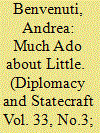

|
|
|
|
|
| Summary/Abstract |
Australian Prime Minister Edward Gough Whitlam has gone down in history as the man who ended two decades of Australian neglect of Asia. Having come to power with the ambitious goal of making a quantum leap in Australia’s regional engagement, Whitlam is widely credited with bringing his country closer to Asia. However, such a representation of Whitlam’s Asian diplomacy does not quite stand up to a careful examination of the historical record. Whitlam’s new course in foreign affairs not only failed to inject new momentum into Canberra’s policy of regional engagement, but it also perplexed – or even frustrated – more than one regional actor. It is no coincidence that he spent nearly half of his prime ministership seeking to dispel the perception that Australia was becoming isolationist. Focussing on Whitlam’s policy towards Southeast Asia, an area of crucial strategic importance for Australia, this analysis provides a corrective, based on recently declassified Australian, British and American government files, of Australia’s regional engagement in the early 1970s.
|
|
|
|
|
|
|
|
|
|
|
|
|
|
|
|
| 6 |
ID:
186046
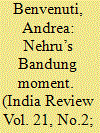

|
|
|
|
|
| Summary/Abstract |
This article explores Jawaharlal Nehru’s role in convening the 1955 Bandung Conference. Drawing upon previously embargoed Indian and Western government records, it sheds light on a largely overlooked aspect of Nehru’s Cold War diplomacy. By doing so, it shows that Nehru did not attach, at least initially, much importance to Indonesia’s calls for an Asian-African conference. Only in late 1954 did he show more interest in the Indonesian proposal. Three factors pushed Nehru in this direction: his reluctance to embarrass Indonesia, his concerns about American regional policy and his desire to exploit China’s support for peaceful coexistence. Confronted with renewed regional tensions but able to capitalize on Beijing’s new-found reasonableness, Nehru threw India’s diplomatic weight behind Indonesia’s proposal with the view to furthering his vision of “areas of peace.” Nehru’s “Bandung moment,” however, was short-lived. Although the Bandung Conference appeared to have advanced India’s national interests in the short term, its benefits were more questionable in the long run. In the end, India was unable to tie China down to its regional vision and protect itself against Chinese belligerence. Faced with a mounting Chinese challenge, Nehru’s strategy, centered upon nonaligned peaceful coexistence, manifested all its limitations.
|
|
|
|
|
|
|
|
|
|
|
|
|
|
|
|
| 7 |
ID:
069058
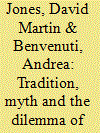

|
|
|
|
|
|
|
|